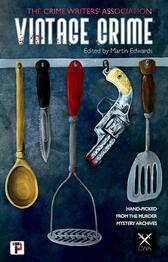
As such, the most elemental change to track in the field of crime fiction as represented by the tales is the transition from the mystery puzzle to the psychological crime story. Whether this change is a welcome or unwanted one depends on the reader, of course. But it is no accident that Story Number Five, "The Woman Who Had Everything" by Celia Fremlin, is all about Getting Inside the Protagonist's Noggin. Quoth the Fremlin:
"He never thought about anything else any more, at home or away: a far cry from those golden holidays in the first years of their marriage, when he'd sit or lie beside her hour after hour, rubbing oil on her brown body, murmuring into her ear nonsense to make her laugh or endearments to make her glow – face down on the hot sand – with secret joy."
"The Nuggy Bar" by Simon Brett – fans of Brett's theater-set Charles Paris series already know of his dry wit and darkly comic view of life and death. Here we have a great satiric send-up involving a middle manager for a cleaning product company and his decision to plan a murder literally by the book – in this case, using a handbook of business precepts meant to shepherd the shaping and launch of a new product.
"The Hand That Feeds Me" by Michael Z. Lewin – a gimmick, but a good one whose brevity doesn't overstay its premise. A stray dog (who narrates) delivers an unconventional justice to avenge the death of a homeless stranger who was kind to him.
"Cold and Deep" by Frances Fyfield – puppies don't fare well at all, but this slow-but-smoldering tale sets up a confrontation between an earnest young woman and her sadistic in-law that builds to a satisfying, haunting climax.
"Interior, with Corpse" by Peter Lovesey – one of only a few post-1950 stories in the mix that gives a nod to sleuthing and detection, and the premise is delicious: a very detailed rendering of a crime scene shows up in an art gallery as part of a deceased painter's collection. The problem is that the picture's setting is recognizably the home of an esteemed retired fighter pilot and the dead woman looks eerily like someone who disappeared from the village decades ago.
And Martin Edwards provides "Melusine", an uncomfortably dystopian tale of a plague ravaging Britain's livestock. As the protagonist kills diseased sheep and cattle in countless numbers, he wonders just how close his wife and his drinking buddy have gotten in his absence.
Other honorable mentions: The H.R.F. Keating story "Inspector Ghote and the Noted British Author" follows his likeable Indian inspector as he contends with an irritating Western celebrity as a guest; "The Egyptian Garden" by Marjorie Eccles sketches a bittersweet friendship between a socialite living in Egypt and her young and bright servant; and Mick Herron provides a 21st-century character twist within "All She Wrote," a 2008 story that subverts expectations but feels more technical than immediate.
 RSS Feed
RSS Feed